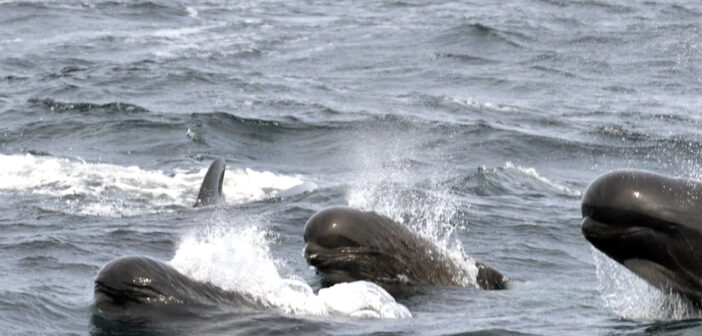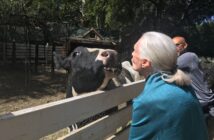An open letter to the authorities and people in the Faroe Islands and Denmark
Whales and dolphins – new knowledge and new compassion
We, members of the Jane Goodall Institute’s Cetacean Committee (JGICC), are reaching out to the government and citizens of the Faroe Islands, as well as to all those in positions of influence in the region and Denmark.
As summer arrives in the northern hemisphere, we recognize that this marks the beginning of the hunting and killing of pilot whales and other cetaceans in the Faroe Islands. We urge all relevant parties to consider whether the desire to continue this practice truly outweighs the growing sensitivity towards animal welfare.
We understand and sympathize with the value of local community bonds and cultural traditions. Nevertheless, across cultures, we see values shifting. People around the globe have become increasingly sensitive to animal welfare. Things that were once accepted, are no longer today or are at least questionable – cock fighting, bull fighting, throwing live cats from towers, riding elephants and keeping dolphins in tanks. The same applies to the hunting and killing of whales along the Faroe Islands.
As this is an open letter, we will provide some background to ensure everyone understands the context. Between 2010 and 2020, each year Faroese whalers killed an average of over 650 pilot whales and more than a hundred other dolphins. In September 2021, in a single hunt more than 1,400 Atlantic white-sided dolphins were killed.
The hunting is primarily defended on the grounds of tradition, with the argument that pilot whales have been hunted in the Faroe Islands for many hundreds of years, at a time when the local population heavily relied on food from the sea. While we acknowledge this historical context, it is important to note that today’s hunting is conducted from motorized vessels and coordinated using modern communication technologies. Furthermore, the meat harvested is no longer necessary to meet any pressing nutritional needs in the islands, which are now relatively affluent, even by European standards.
The undeniable cruelty of the methods used to corral and kill these mammals has come into sharper focus recently. Entire pods of pilot whales and other dolphins are driven into the shallows of specific bays. Their strong social bonds, which usually help protect them in the open ocean, cause them to remain together even when faced with these highly stressful and deadly circumstances. One by one, they are killed using a method that may paralyse them before they bleed out and die. Those that are stranded must wait their turn, trapped in the shallow water. Typically, every member of the pod is killed, including dependent calves.
This entire process has recently been reviewed by Alick Simmons, a renowned welfare expert and former Deputy Chief Vet in the UK, who clearly articulates the cruelty inherent in these hunts. He states: “The entire process of the Grindadráp [the hunt]is inherently inhumane: From the beginning of the drive through to the animals being driven into shallow water and then dragged onto the beach, the whole process will almost certainly be highly distressing. This conclusion is reinforced when one considers the likely disorientation from the noise and the other activities of the hunters, and the likely distress from being isolated from its social group. Severing the spinal cord is prohibited in the EU as a means of restraint for farmed animals, and it is not considered a suitable killing method.” (Frontiers in Marine Science, July 2024[1])
He goes on to question the effectiveness of the ‘spinal lance’ that is used to finally kill these mammals, raising the concern that it may leave them alive and conscious whilst they bleed out.
Such killings are prohibited in neighbouring European countries. As a group of scientists dedicated to the welfare of cetaceans, we possess a profound understanding of these mammals, with many of us conducting research on them for decades. Cetaceans are known to be highly intelligent and social creatures, living in tightly-knit communities where they learn from each other. Similar to great apes, they have complex emotional lives and distinct personalities. The suffering caused by current hunting methods is significant and likely includes the awareness that individual animals have of the distress experienced by other members of their pods.
The Faroe Islands have a rich and unique history, along with stunning and dramatic landscapes. However, the archipelago is primarily known globally for its controversial treatment of marine mammals. The graphic scenes of the hunts from the islands are frequently shared on social media, shocking and scandalizing viewers globally. We, along with many others, find these images truly horrific, and the suffering is heart-wrenching.
Unsurprisingly, many individuals and organizations have condemned this practice and called for it to end, and we join our voices with theirs. While many traditions hold value and are worth preserving, we urge the Faroe Islands to reconsider and ultimately abolish this cruel practice. Similar to how other cultures have moved on from traditions that are harmful to animals, such as harvesting and using bear bile, or consuming dog meat, we hope for a positive change here as well that will undoubtedly also lead to more tourism opportunities for your beautiful islands.
We thank you for your consideration.
Yours faithfully,
Dr. Jane Goodall DBE, Founder – the Jane Goodall Institute & UN Messenger of Peace,
Dr. Denise Herzing, Melody Horrill, Dr. Soojin Jang, Dr. Koen Margodt, Dr. Lori Marino, Dr. Ada Natoli, Rick Quinn, Dr. Naomi Rose, Charles Vinick, and Dr. Ingrid Visser – JGI Cetacean Committee.
[1] You can find his paper and conclusions in full here: https://www.frontiersin.org/journals/marine-science/articles/10.3389/fmars.2024.1368524/full






